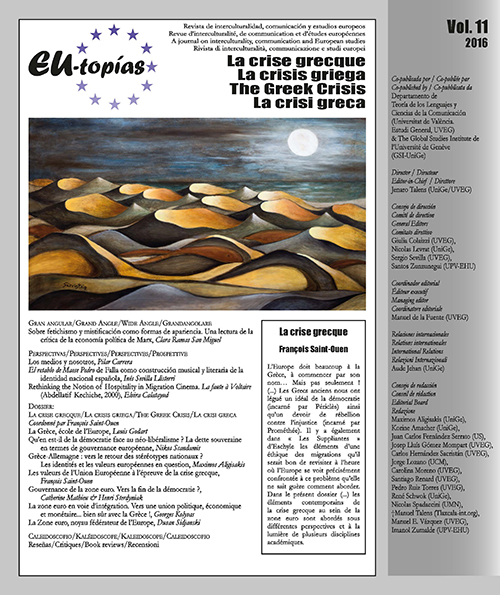European Union Values to the Test in Greek Crisis
DOI:
https://doi.org/10.7203/eutopias.0.18684Keywords:
European values, crisis, Greece, ethos, politics Abstract
Abstract
It is important to point out that there is some differences between the values of the European Union as they are perceived by the citizens, as they are asserted in the treaties and by the jurisprudence, and finally as they might be concretely derived from the functioning of the EU. From this last point of view, the Greek crisis in the Eurozone indicates that, behind the declarations and mission statements, there is today a relative uncertainty regarding the kind of values that the European Union, which has developed along an economic axis, is supposed to put into effect. This article examines namely the consequences of the Greek crisis on EU values, like human dignity, democracy, freedom and equality. It shows that there is, inside the Union, a certain variety of understandings of these values.
 Downloads
Downloads
 References
References
Bréchon, Pierre (2013), « L’individualisation des sociétés européennes », Les valeurs des Européens, Futuribles, 395, juillet-août 2013, pp. 119-136.
Castoriadis, Cornelius (1975), L’institution imaginaire de la société, Paris : Seuil.
— (2007), La montée de l’insignifiance, Paris : Seuil (Points).
Connoly, William (1983), The Terms of Political Discourse, Princeton, NJ : Princeton University Press.
Constantinesco, Vlad (2008), « Les valeurs dans le traité établissant une Constitution pour l’Europe », Samantha Besson, Francis Cheneval & Nicolas Levrat (éd.), Des valeurs pour l’Europe ?, Bruxelles : Bruylant Academia, pp. 71-90.
Dufeu, Sylvain (2005), Valeurs et constitutions européennes, Paris : L’Harmattan.
Gazin, Fabienne (2014), « Les valeurs dans les politiques d’asile, visas, immigration et franchissement des frontières: quelle place réelle pour la liberté, la sécurité et la justice ? », Laurence Potvin-Solis (dir.), Les valeurs communes dans l’Union européenne, Bruxelles : Bruylant, pp. 235-249.
Jauss, Hans Robert (1978), Pour une esthétique de la réception, Paris : Gallimard.
Monnet, Jean (1976), Mémoires, Paris : Fayard.
Olbrechts-Tyteca, Lucie & Perelman, Chaïm (1958), Traité de l’argumentation : la nouvelle rhétorique, Paris : PUF.
Paquet, Marcel (2004), Nous autres Européens, Paris : La Différence.
Perelman, Chaïm (1977), L’empire rhétorique, Paris : Vrin.
Rougemont, Denis de (1977), L’avenir est notre affaire, Paris : Stock.
Seiler, Daniel-Louis (2014), Qu’est-ce que l’Europe ?, Bruxelles : Éditions de l’Université de Bruxelles.
Williams, Andrew (2010), The Ethos of Europe : Values, Law and Justice in the EU, Cambridge: Cambridge University Press.
Downloads
Published
How to Cite
-
Abstract127
-
PDF (Français )66
Issue
Section
License
![]()
The authors conserve the copyright. All content published in EU-topías. Journal of interculturality, Communication, and European Studies are subject to the license Creative Commons Attribution-NonCommercial-ShareAlike 4.0 license. The full text of the license can be found at <http://creativecommons.org/licenses/by-nc-sa/4.0>
They may be copied, used, disseminated, transmitted and publicly displayed, provided that:
- The authorship and original source of the publication is cited (journal, publisher and URL of the work).
- They are not used for commercial purposes.
- The existence and specifications of this license of use are mentioned.
It is the responsibility of the authors to obtain the necessary permissions for images that are subject to copyright.



